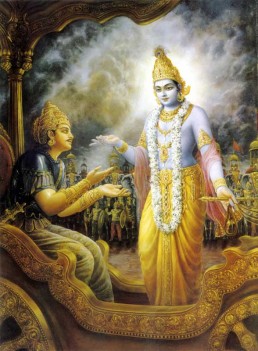Swami Chinmayananda
Swami Chinmayananda Commentary
Following the tradition of the scriptures, the disciple now asks a definite question upon the very theme of the discussion. The very question shows that Arjuna has, to a large extent, got out of the hasty conclusions which he exhibited until the beginning of the second chapter. He has become introspective, and therefore, conscious of certain forces working within himself that were ruining and obstructing the play of his own higher impulses. The doubt is couched in such familiar words that it appears as though it is a doubt raised by some student of our own times.
There is no living man who has not in himself a sufficiently clear conception of the good and the meritorious. Every one understands intellectually what is RIGHT, but it is only when it comes to action that one invariably gets tempted to do the WRONG. This paradoxical confusion, between one’s ideology and one’s own actions, becomes quite a big problem to all those who try to introspect and review themselves.
The Divine in us, with Its nobler aspirations, wants to fulfil Itself with Its higher impulses and subtler achievements, but the animal instinct in us tempts us away, and we walk the path of the baser joys of the flesh. This invariably happens even against our own wishes. Arjuna is enquiring of the Lord: “What is the exact nature of this SATAN-in-our-bosom which thus systematically loots away the good in us?”Varshneya is the name of Lord Krishna, meaning: “One born in the family of the Vrishnis.
“THE LORD SAYS: “LISTEN. I SHALL TELL YOU WHO THAT ENEMY IS OF WHOM YOU ASK — WHO IS THE SOURCE OF ALL EVIL”:
Adi Sankara Commentary
Atha, now then; varsneya, O scion of the Vrsni dynasty; being prayuktah, impelled; kena, by what acting as the cause; as a servant is by a king, does ayam, this; purusah, man; carati, commit; papam, sin, a sinful act; api, even; anicchan, against his wish, though not himself willing; niyojitah, being constrained; balat, by force; iva, as it were-as if by a king, which illustration has already been given? The Lord (Bhaga-van) said: ‘You hear about that enemy, the source of all evil, of which you ask-.’ ‘Bhaga is said to consist of all kinds of majesty, virtue, fame, beauty, detachment as well as Liberation [Liberation stands for its cause, Illumination.], (V.P.6.5.74). That Vasudeva, in whom reside for ever, unimpeded and in their fullness, the six qualities of majesty etc. and who has the knowledge of such subjects as creation etc., is called Bhaga-van. ‘He is spoken of as Bhaga-van who is aware of creation and dissolution, gain and loss, [Gain and loss stand for future prosperity and adversity.] ignorance and Illumination of all beings’ (ibid. 78).
The Bhagavad Gita with the commentary of Sri Sankaracharya – Translated by Alladi Mahadeva Sastry
Holy Geeta – Commentary by Swami Chinmayananda
The Bhagavad Gita by Eknath Easwaran – Best selling translation of the Bhagavad Gita
The Bhagavad Gita – Translation and Commentary by Swami Sivananda
Bhagavad Gita – Translation and Commentary by Bhaktivedanta Swami Prabupadha
Srimad Bhagavad Gita Chapter 3 – Verse 36 – 3.36 atha kena prayukto – All Bhagavad Gita (Geeta) Verses in Sanskrit, English, Transliteration, Word Meaning, Translation, Audio, Shankara Bhashya, Adi Sankaracharya Commentary and Links to Videos by Swami Chinmayananda and others – 3-36

